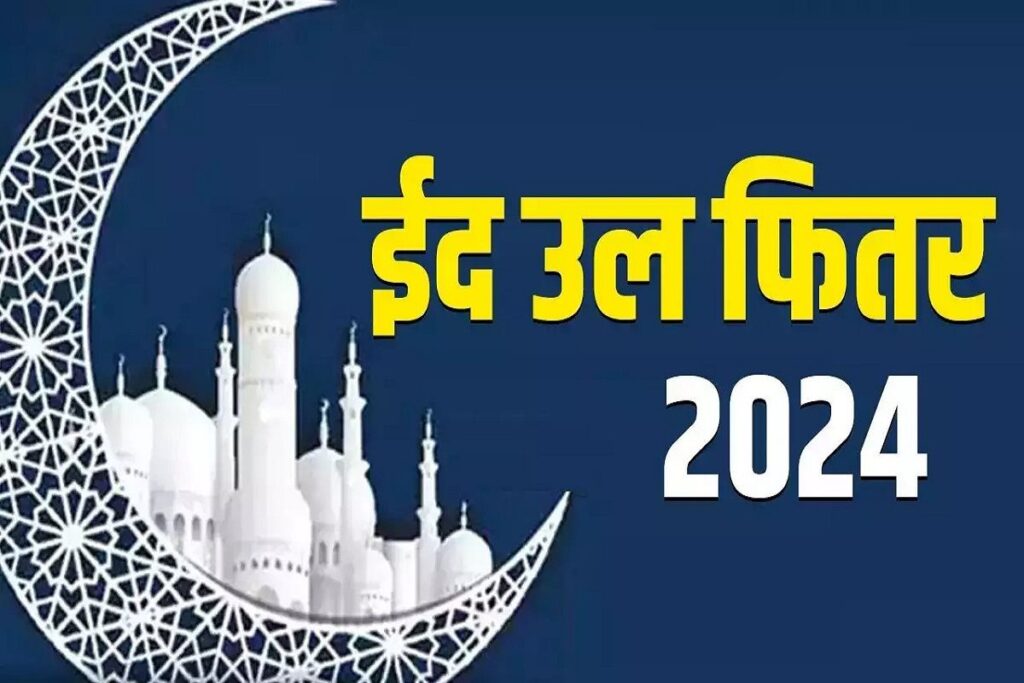Eid ul-Fitr 2024: Date, History, Significance, Celebration of Meethi Eid

[widget id=”custom_html-18″]
Eid ul-Fitr, also known as the “Festival of Breaking Fast,” is a momentous Islamic holiday. It marks the end of Ramadan, the holy month of fasting observed by Muslims. During Ramadan, faithful individuals abstain from food and drink from dawn until dusk, dedicating themselves to prayer, reflection, and acts of kindness.
As the crescent moon graces the sky, signaling the conclusion of Ramadan, Muslims eagerly anticipate the arrival of Eid ul-Fitr. Here’s what makes this festival so special:
Feasting After Fasting : Imagine the hunger and anticipation after a month of fasting! Eid ul-Fitr allows Muslims to break their fast during daylight hours. It’s a time for hearty meals, shared with family and friends.
Prayers at Dawn : On the first day of Eid, communities gather for communal prayers (known as ṣalāt) at daybreak. These prayers express gratitude, seek forgiveness, and celebrate unity.
Warm Greetings : Friends and neighbors exchange warm greetings, saying “Eid Mubarak!”which translates to “Blessed Eid.” It’s a beautiful way to spread joy and goodwill.
New Attire : Dressing in new clothes is a cherished tradition. Families adorn themselves in colorful garments, symbolizing renewal and happiness.
Visiting Loved Ones : Eid is a time for heartfelt visits. Families pay respects at the graves of departed relatives, reinforcing bonds across generations.
Why Is Eid ul-Fitr Celebrated?
Eid ul-Fitr holds immense significance in Islam. Prophet Muhammad (peace be upon him) emphasized its importance, saying, “Allah has given you better than those feasts: Eid-ul-Adha and Eid-ul-Fitr” 1. It’s a time to rejoice, connect with loved ones, and express gratitude for life’s blessings.
Remember, the exact date may vary slightly based on regional moon sightings, but the spirit of Eid remains universal. So, mark your calendars, prepare your festive attire, and get ready to celebrate the joyous arrival of Eid ul-Fitr in 2024!
[widget id=”custom_html-19″]
When Is Eid ul-Fitr 2024?
In 2024, Eid ul-Fitr is expected to fall around April 10th or April 11th and 12th. However, the exact date depends on the sighting of the moon. Traditionally, the moon sighting is a community event, and religious authorities announce the official date based on this celestial observation.
In 2024, Eid ul-Fitr will be celebrated on different dates in various countries:
India: April 11, 2024
Pakistan: April 10, 2024
Philippines: April 10, 2024
Malaysia: April 10, 2024
Australia: April 10, 2024
Eid ul-Fitr Significance
Eid ul-Fitr, also known as Meethi Eid, is a joyous occasion celebrated by Muslims worldwide. As the crescent moon graces the sky, families come together to mark the end of Ramadan, the holy month of fasting, prayer, and reflection. Let’s delve into the significance of this special day.
- The End of Ramadan: A Spiritual Achievement
Ramadan, the ninth month of the Islamic calendar, holds immense importance for Muslims. During this sacred period, believers fast from dawn to sunset, refraining from food, drink, and other physical needs. Fasting is one of the Five Pillars of Islam, representing acts of worship that every Muslim must observe. It’s a time for self-discipline, empathy, and drawing closer to Allah.
- The Joyous Celebration
As the last day of Ramadan arrives, hearts brim with anticipation. Families wake up early, don their finest attire, and head to the mosque for a special congregational prayer known as Salat al-Eid. This prayer is a collective expression of gratitude and devotion. Afterward, they exchange warm greetings, hug, and wish each other “Eid Mubarak!”, which translates to “Blessed Eid!”.
- The Feast and Generosity
Food plays a central role in Eid celebrations. Families prepare sumptuous meals, including traditional dishes and delectable sweets. It’s a time to share love and abundance with loved ones. But it doesn’t end there—Muslims extend their generosity beyond their homes. They give Eidi (gifts of money) to children, donate to charity, and provide meals to those less fortunate. The spirit of giving and compassion permeates the air.
- Spiritual Renewal
Eid ul-Fitr signifies spiritual renewal. It’s a chance to seek forgiveness, reflect on personal growth, and strengthen one’s faith. Muslims believe that their good deeds during Ramadan are multiplied manifold on this auspicious day. They pray for blessings, guidance, and a heart full of gratitude.
- Community Bonding
Eid transcends borders and unites Muslims across continents. Whether in bustling cities or serene villages, the sense of community prevails. Families visit each other, share meals, and celebrate together. Elders bless the younger ones, and children eagerly await their Eidi. It’s a time to mend relationships, reconcile differences, and foster harmony.
- Meethi Eid: The Sweetness of Togetherness
In India, Pakistan, the Philippines, and beyond, Meethi Eid brings families closer. The name itself—Meethi Eid—captures the essence of this celebration. It’s not just about sweets; it’s about the sweetness of togetherness, love, and shared memories.
How Is Eid ul-Fitr Celebrated?
Morning Prayers : On Eid morning, Muslims gather at mosques for special prayers. They express gratitude to Allah for the strength to complete the month-long fast.
Breaking the Fast : After a month of self-discipline, Muslims break their fast with dates and water. It’s a moment of relief and celebration.
Feasting : Families prepare delicious meals and invite relatives and friends to share in the joy. Sweets, biryanis, and other traditional dishes adorn the tables.
Charity and Giving : Eid is a time for generosity. Muslims give to those in need donating food, clothes, and money to the less fortunate.
Eidi : Elders give “Eidi” (gifts of money) to children. It’s a delightful tradition that brings smiles to young faces.
Dressing Up : Everyone wears their finest clothes colorful outfits, sparkling jewelry, and henna-adorned hands.
[widget id=”custom_html-21″]